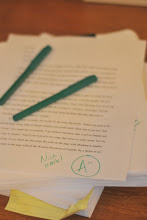This opinion piece in the NYTimes made me think. It's about the economy, but I see parallels to what's happening in education lately too.
Brooks argues:
"The economic approach embraced by the most prominent liberals over the past few years is mostly mechanical. The economy is treated like a big machine; the people in it like rational, utility maximizing cogs. The performance of the economic machine can be predicted with quantitative macroeconomic models. [...] Everything is rigorous. Everything is science."
When I saw Ravitch speak about her latest book recently, she wondered how a liberal President could have embraced ideas about education (measure and punish, teacher accountability, wide sweeping top-down measures to control what happens in classrooms, etc.) that were not in essence liberal. I wonder if there's some connection here to what Brooks is saying about the dominate liberal thinking toward fixing our economy, an approach that for the most part excludes "psychology, emotion, and morality"--concepts that he says he would expect in liberal thinking on the economy.
Maybe. All I know is that education thinking at the policy level is heading in the wrong direction. My state is proposing an "assessment system" that will mandate not just a state-developed summative assessment at the end of the school year, but quarterly interim assessments (that's now FIVE state tests each year) and formative assessments that are ongoing. If these are delivered to the schools from the state, by the way, they are actually no longer formative assessments which work (the research tells us) because they are contextual, immediate, and respond to factors that emerge in the daily life of a classroom. And this interim assessment thing--there's no body of research (yet) to show that they work in the ways that proponents claim they do. I just can't imagine that five state tests in a year are going to improve things in my classroom and make my students more successful, even if it does bring up their test scores.
It's like no one at the policy level is actually thinking about this stuff. There's no thought in the realm of "psychology, emotion, or morality"--how might all this testing affect teachers and students psychologically, emotionally, or morally? Who can actually teach and learn when they are being forced to do so? Where's the love of learning?
Without that (a love of learning), there is no learning actually.
Anybody know how to stop this runaway train?
You should read the rest of Brooks' argument and see what parallels you're seeing to educational policy right now. And let me know what you think.
M. Shelley
Subscribe to:
Post Comments (Atom)


No comments:
Post a Comment